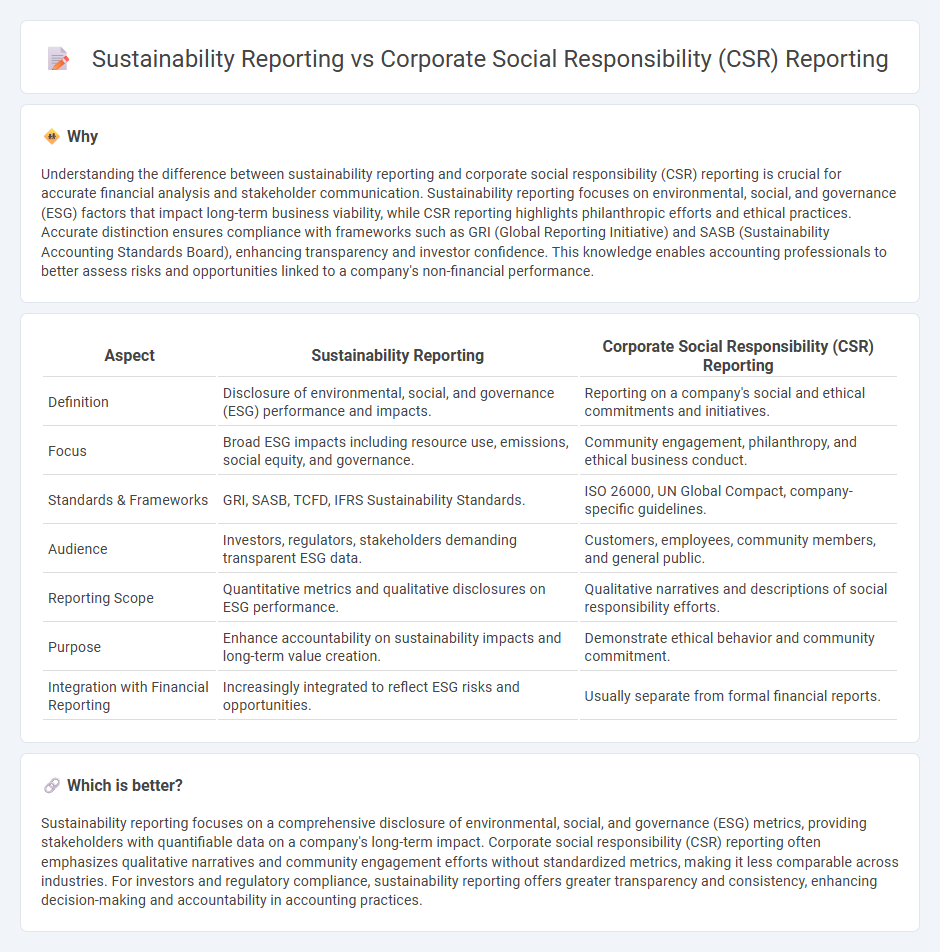
Sustainability reporting focuses on a company's environmental, social, and governance (ESG) performance, providing measurable data on resource use, emissions, and social impact aligned with global standards like GRI and SASB. Corporate Social Responsibility (CSR) reporting emphasizes a company's ethical commitments, community engagement, and philanthropic efforts, often presented through qualitative narratives rather than quantitative metrics. Explore further to understand how these distinct reporting practices enhance transparency and accountability in modern accounting.
Why it is important
Understanding the difference between sustainability reporting and corporate social responsibility (CSR) reporting is crucial for accurate financial analysis and stakeholder communication. Sustainability reporting focuses on environmental, social, and governance (ESG) factors that impact long-term business viability, while CSR reporting highlights philanthropic efforts and ethical practices. Accurate distinction ensures compliance with frameworks such as GRI (Global Reporting Initiative) and SASB (Sustainability Accounting Standards Board), enhancing transparency and investor confidence. This knowledge enables accounting professionals to better assess risks and opportunities linked to a company's non-financial performance.
Comparison Table
| Aspect | Sustainability Reporting | Corporate Social Responsibility (CSR) Reporting |
|---|---|---|
| Definition | Disclosure of environmental, social, and governance (ESG) performance and impacts. | Reporting on a company's social and ethical commitments and initiatives. |
| Focus | Broad ESG impacts including resource use, emissions, social equity, and governance. | Community engagement, philanthropy, and ethical business conduct. |
| Standards & Frameworks | GRI, SASB, TCFD, IFRS Sustainability Standards. | ISO 26000, UN Global Compact, company-specific guidelines. |
| Audience | Investors, regulators, stakeholders demanding transparent ESG data. | Customers, employees, community members, and general public. |
| Reporting Scope | Quantitative metrics and qualitative disclosures on ESG performance. | Qualitative narratives and descriptions of social responsibility efforts. |
| Purpose | Enhance accountability on sustainability impacts and long-term value creation. | Demonstrate ethical behavior and community commitment. |
| Integration with Financial Reporting | Increasingly integrated to reflect ESG risks and opportunities. | Usually separate from formal financial reports. |
Which is better?
Sustainability reporting focuses on a comprehensive disclosure of environmental, social, and governance (ESG) metrics, providing stakeholders with quantifiable data on a company's long-term impact. Corporate social responsibility (CSR) reporting often emphasizes qualitative narratives and community engagement efforts without standardized metrics, making it less comparable across industries. For investors and regulatory compliance, sustainability reporting offers greater transparency and consistency, enhancing decision-making and accountability in accounting practices.
Connection
Sustainability reporting and corporate social responsibility (CSR) reporting are interconnected as both focus on measuring and communicating an organization's environmental, social, and governance (ESG) performance. Sustainability reporting emphasizes long-term environmental impact and resource management, while CSR reporting highlights ethical practices, community engagement, and social contributions. Together, they provide comprehensive transparency on a company's commitment to responsible business practices and value creation beyond financial metrics.
Key Terms
Triple Bottom Line
Corporate Social Responsibility (CSR) reporting primarily emphasizes a company's ethical obligations and social impact, often highlighting philanthropy and community engagement. Sustainability reporting, grounded in the Triple Bottom Line framework, integrates environmental stewardship, social equity, and economic performance to provide a holistic view of long-term business impact. Explore further to understand how aligning CSR and sustainability reporting can enhance corporate accountability and stakeholder trust.
Integrated Reporting
Corporate Social Responsibility (CSR) reporting primarily highlights a company's social and ethical commitments, while sustainability reporting encompasses environmental, social, and governance (ESG) factors to provide a comprehensive view of corporate impacts. Integrated Reporting (IR) combines financial and non-financial information to demonstrate how an organization creates value over time, offering a holistic framework that links CSR and sustainability efforts to overall business strategy. Explore how Integrated Reporting enhances transparency and stakeholder engagement by bridging CSR and sustainability reporting for deeper corporate accountability.
Materiality
Corporate social responsibility (CSR) reporting centers on a company's ethical impact and social commitments, emphasizing stakeholder interests in community, labor, and governance issues. Sustainability reporting extends beyond CSR by incorporating environmental, social, and governance (ESG) factors with a strong focus on materiality to identify and disclose issues that significantly affect business performance and stakeholder value. Explore how aligning materiality in CSR and sustainability reporting enhances transparency and strategic decision-making.
Source and External Links
How do you structure a Corporate Responsibility Report? - Corporate social responsibility (CSR) reports are annual publications detailing a company's sustainability and ethical efforts, providing transparency, risk management, enhanced investor confidence, and regulatory compliance with frameworks such as CSRD and TCFD.
Pursuing Accountability: CSR Reporting Strategies & Insights - A CSR report documents a company's environmental, social, ethical, and philanthropic efforts, is mostly voluntary in the U.S., but encouraged for transparency and future regulatory compliance aligning with ESG factors.
What is CSR reporting? - CSR reporting provides transparency on a company's social and environmental performance through non-financial metrics and is increasingly important for stakeholders despite being mostly voluntary, with some jurisdictions requiring disclosures.
 dowidth.com
dowidth.com